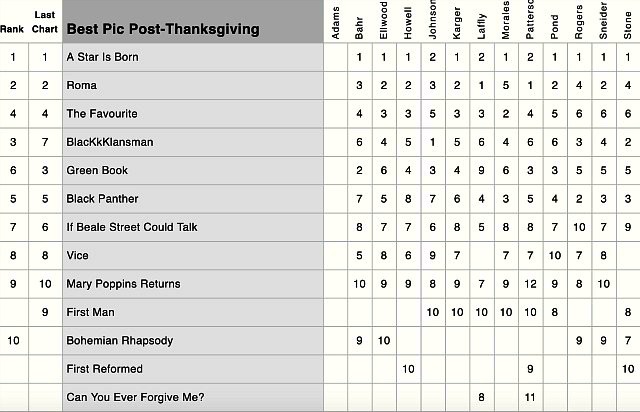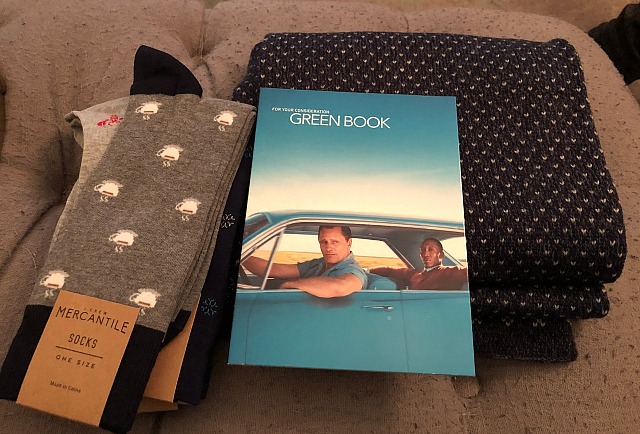Wiki synopsis for Bryan Bertino‘s The Strangers (2008), which costarred Liv Tyler and Scott Speedman: “Kristen (Tyler) and James (Speedman) are expecting a relaxing weekend at a family vacation home, but their stay turns out to be anything but peaceful as three masked intruders leave Kristen and James struggling for survival.”
“Around Seven It’s Marginal, Right?”
You have to figure that today’s seven-year-olds are probably more hip to the Santa Claus fraud than their 20th Century counterparts. I was tipped off when I seven or eight. More likely seven. A friend from across the street woke me. It was probably my first encounter with serious emotional betrayal, and at the hand of my parents yet! The feeling stuck, and one result was my inability to pass along the Santa myth to own kids with any conviction. I think I might have actually told them that Santa is more of a symbol of love and generosity than anything else.
Question: Melania needs a cue card to speak with kids about Christmas?
Defiant Message, Murky Lighting
Posted sometime around 1:30 pm eastern. YouTube commenter: “I don’t know what that was, but I definitely enjoyed it more than season 6 of House of Cards.”
On the other hand The Boston Globe is reporting that Kevin Spacey has been charged with felony sexual assault in Massachusetts. He allegedly sexually assaulted “the teenage son of former Boston WCVB-TV news anchor Heather Unruh at a Nantucket bar in July 2016,” according to Matt Rocheleau’s story.
Minor But Over-The-Top Coen Characters
HE favorite: The Inside Llewyn Davis Manhattan woman (older, Jewish, good heart) ranting about her orange cat being the wrong orange cat due to the absence of a scrotum. This MUBI essay is only six days old as we speak.
Why Convert “Roma” to 70mm Film?
Last night I re-sampled Roma on Netflix. My fourth viewing. The black-and-white compositions have always looked great on theatrical screens, but they look even better on my Sony 930C 65″ 4K HDR, especially via the new Samsung 4K Bluray player. I could live in that film, that eye spa. The only film that offers a similar monochrome wonderland vibe is Pawel Pawlikowski‘s Cold War.
But I’m of two minds about some forthcoming 70mm presentations that Netflix has planned. On one hand I’d like to see what it looks like; on the other I know it can’t look as good as it does at home or via digital projection.
I’m slightly puzzled by a quote from Roma director Alfonso Cuaron in a 12.20 Variety piece by Dave McNary, to wit: “Roma is designed to be meaningful whether experienced at home or on the big screen but offering cinema lovers the opportunity to see it in theaters is incredibly important to me. The 70mm print of Roma shows unique details not available on any other version. Being shot in 65mm, these prints bring live detail and contrast only possible using a big format film. It is for sure the most organic way to experience Roma.”
I heard this morning from a tech-savvy friend who disagrees with Cuaron:
“The foundation of Roma is the beautiful, shimmering, nitrate-like black-and-white imagery,” he said. “I wonder if it was captured in color and affected in post?
“The strange thing is the announcement that they’re making some 70mm prints to have an ‘organic’ look, whatever that is. The publicity mentions a large-format 65mm negative, but Roma was shot as data.
“65mm digital, straight from the chip, blows projected 70mm celluloid out of the ballpark. If you go from original finalized data to a recorded negative, and then to a print and then project it, and projection is almost always flawed unless you’re screening it in the Academy or some other first-rate venue…if you do all that you’ve lost probably 25% of the image quality. Not to mention trying to achieve the purity of the black-and-white data on color stock.
“So why project it on 70mm film?”
I’ve asked Cuaron about these disparate views, and whether my tech-savvy friend might be missing something. Haven’t heard back.
Why “Marwen” Died
Variety‘s Brent Lang is reporting that Robert Zemeckis’ Welcome to Marwen, which suffered an embarassing wipeout last weekend, will lose between $45 and $50 million when all is said and done.
There are three reasons, I suspect, why Marwen died so quickly and decisively. One, who wants to see a movie about a place or an entity or a state of mind called Marwen, which sounds like some nowhere burgh off the New Jersey Turnpike? Two, people could smell the oversaturation of twee. And three, moviegoers are sick of Steve Carell‘s mopey and mournful performances — The Big Short (mopey investor Mark Baum), Last Flag Flying (mopey dad mourning his dead son) and especially Beautiful Boy (mopey dad trying to save his son from drug addiction).
Allen Susses Berniebot Attack on Beto O’Rourke
Two or three days ago some Berniebots went after Beto O’Rourke’s partly centrist, somewhat politically incorrect voting record in the House of Representatives over the last four or five years. Ardent supporters of Bernie Sanders are claiming, in other words, that O’Rourke isn’t progressive enough and has been too accommodating to Republican and corporate interests.
The most thorough and agenda-free answer to this, it seems to me, was posted yesterday on Twitter by NBC political reporter Jonathan Allen. He reviewed 167 votes in which O’Rourke went against the majority of Democrats, and found that he’s a reasonably forward-looking moderate-mixed lefty.
Allen: “A fair reading of the votes is that [O’Rourke] isn’t always aligned with the most progressive set in the Democratic Caucus but that he usually is — and that he doesn’t like dilatory votes.”
“Does this mean he’s ‘progressive’ or ‘progressive enough’?”,” Allen concluded. “Not for me to decide. Certainly, each vote will get its vet.
“But it’s fascinating that the first shots of the invisible 2020 Democratic primary are Bernie backers targeting O’Rourke. A fair reading of the politics is that Sanders backers are worried about his pull with progressives and millennials — and that is framed by portraying O’Rourke as a tool of the old Democratic establishment. This fight is just starting, and it will be interesting to watch. It’s easy to dismiss reporting on it as ‘horserace’ journalism, but the way the candidates, their campaigns and their supporters engage in politics is a big part of how campaigns are won and lost.”
Post-Surgical Perspective
I’m a fairly robust and energetic type, but recovering from surgery over the past three weeks has reminded me that you can’t shrug off biological vulnerability. We’re not made of hard plastic, steel and titanium, and it hurts when a scalpel slices into your skin and digs into your muscles, tendons, fatty tissue and bones. It takes weeks to really feel like yourself again, and you can get easily accustomed to popping pain pills — trust me.
And I went through one of the least traumatic surgeries imaginable — a skin-removal (and then skin graft) operation by first-rate professionals. I’m imagining how it would have felt if I’d been seriously clubbed or shot or stabbed, and then have to recover without decent medical care. Or if I’d been Ethan Hunt in last summer’s Mission: Impossible: Fallout, tear-assing around Paris on a BMW motorcycle and slammed by a speeding car. Or if I’d suffered any of the other ridiculous body traumas that action heroes endure as a matter of routine these days.
Nothing hurts, nobody gets wounded, nobody limps around…every punch or bullet wound or head blow is taped up and shrugged off. Because action filmmakers aren’t interested in wounds or stitches or vulnerability. Which is one more reason why I hate most action flicks today (apart from the fact that they don’t respect physics in the least) and almost all superhero films. And it wasn’t always this way.
There’s a scene in Mike Hodges‘ Get Carter in which a friend of Michael Caine‘s titular character has been beaten up pretty badly, and is all bandaged and bruised and even moaning from the pain. You’re not likely to see anything like that these days.
“You Bastard!”

It was around ’84, maybe ’85. I was platonically friendly with Kathryn, a whipsmart production executive with a good heart who suffered no fools. She was sharing a sizable home in Topanga Canyon with a couple of others, and every so often would invite friends over on the weekend. I attended a couple of these schmoozers. Filmmakers, publicists, producers, writers, production veterans…most in their late 20s to late 30s.
[Click through to full story on HE-plus]
Draggy, Deluded Gurus
For the record: As of 12.24.18, the easily-led-astray, slow-on-the-pickup Gurus of Gold are calling Spike Lee‘s BlacKkKlansman the fourth hottest Best Picture contender — ahead of Green Book and Black Panther and way ahead of Bohemian Rhapsody, the brilliant First Reformed and the widely praised Can You Ever Forgive Me? They may be right (what do I know?) but if you remove the brilliant slam-bang finale that links the KKK to Donald Trump, Spike’s film is a middle-range undercover caper film that no one has done cartwheels over. It’s a better-than-decent package with logic problems. I’m sorry but serious Best Picture contention is a stretch too far. And yet the myopic Gurus believe otherwise. Incidentally: A get-around guy I spoke to this morning isn’t predicting a Green Book Best Picture win, but his nose and his gut are telling him it could happen.


Odd Flavors, Aromas, Road Bendings
The roads of Wilton, Connecticut, where I endured my last two years of high school, were narrower and hillier and twistier back then. In the decades since many roads have been widened and re-graded to some extent, especially in the areas right off Route 7, which is the main drag between Norwalk and Danbury.
[Click through to full story on HE-plus]
Drive, They Said
Late Saturday afternoon I drove the beater from Wilton to Jett and Cait‘s home in Jersey City for a modest Christmas hang-out. Merritt Parkway to Cross County, the Hutchinson River Parkway and into the Bronx, over the George Washington Bridge and down the NJ Turnpike, and three infuriating three loop-dee-loops on the road to Jersey City because the GPS woman lost her mind.
I picked up ex-wife Maggie (i.e., Jett’s mom) at her Warren Street apartment. We landed at Jett and Cait’s around 7 pm. Dinner, dogs, gifts. Watched a movie (Can You Ever Forgive Me?, which I’d seen twice before). Maggie and I left around 10 pm. I went back through the Holland Tunnel ($15 access!) and up the West Side Highway. I was back in the Wilton abode in less than two hours.
Jett, all his life a highly considerate fellow, thinks I’m a fragile reed because I underwent basal-skin-cancer removal and skin graft surgery on 12.4. “Get back okay last night?”, he texted at 6:30 am. “Back in the crib before midnight”, I replied.
Two more days here (today and tomorrow) and then back to Los Angeles on Tuesday morning, and then on to HE’s first Existential Sundance Film Festival, and then down to Santa Barbara in late January.





